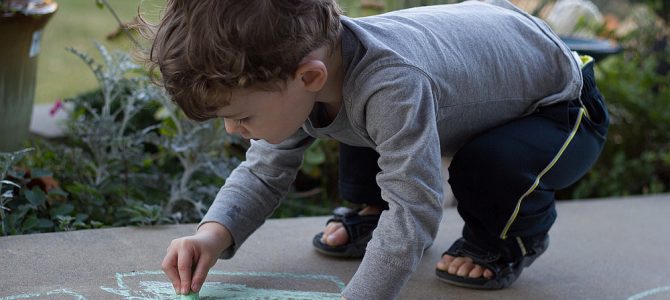
On the one hand, toddlers are adorable. I have two, and they fill my life with cuteness. At any given moment, I can look up to see a tiny human toppling over because she tried to open a cupboard door. Her brother, meanwhile, is usually busy “going to Home Depot” via cardboard automobile or explaining his newest observations about oatmeal.
On the other hand, toddlers are also clearly crazy. We are talking about people who sit down in puddles. They will primly request that you leave the bathroom so they can have “privacy,” but then, two minutes later, streak naked through the house. If they get too tired, they will sob their little hearts out because you just did something they asked you to do. The truth is, it’s easiest to wax sentimental over them once they are in bed for the night.
It is only natural that parents sometimes need to vent about our tiny housemates. Yet somehow, we seem to have created a cultural narrative expressly designed to convince childless adults that kids equal torture. We decry not only “the terrible two’s,” but also “the terrifying three’s” and “ferocious four’s.” This willingness to lump an enormous diversity of individuals into a single negative stereotype would be considered inexcusable if the victims weren’t so small and covered in peanut butter. Not only is it inconsistent with the whole truth, it also makes it harder to enjoy our own children.
Parents of rapidly growing babies, take heart: Just because toddlers are crazy doesn’t mean they aren’t also a lot of fun. The trick is to recognize that there are practical ways to make raising little people more enjoyable. Here are seven things I’ve learned about how to do that
1. Get More Sleep
Toddlers aren’t the only ones who become mad or sad when they are too tired. Parents do, too. This is especially true of moms: Studies show that women need more sleep than men.
2. Be Honest with Yourself
At any given play date, a parent might claim that her tiny offspring “make” her turn on certain annoying TV shows every afternoon, while another says hers “insist” that only certain foods are served every night, and a third’s “won’t let” her fold the laundry.
Most of the time, this language arises because the parents are making decisions against the grain of their official parenting ideals and therefore feel uncomfortable. Like a fourth-grader whose friends “made” her pass notes or whose brother “wouldn’t let” her focus on homework, they declare themselves victims.
Bad idea. We are less likely to resent our kids if we acknowledge that, although they have the power to make certain actions unpleasant for us, they cannot actually force us to do anything. Theoretically, we could even choose to abandon them in a park at the dead of night (although obviously this would be a horrible choice).
In other words, we are the parents, and we ought to either (a) own up to our choice to seek peace and quiet via the current cartoon character de jour, or (b) buck up and stand firm against our children for their own good, even when it is painfully hard to do so. Either option is sometimes the right one.
3. Watch Out for Accidental Lying
Your children may be irritating you by doing exactly what you are (unintentionally) teaching. When my firstborn was an adorably bald, crawling baby, he would come up and bite my leg to signal that I needed to pick him up right now. Of course, I would exclaim, “No! No biting!” He would then cry.
After a moment, I would swoop him up, because, after all, he was crying. My husband eventually pointed out that I was accidentally conveying the message that biting mommy was an effective way to get picked up. In a sense, I was lying to him by “telling” him that biting was a good way to get what he wanted. The biting issue went away when I stopped reinforcing it.
I have heard many parents complain that their children won’t take no for an answer. These tend to be the same moms or dads who give in persistent requests with, “Okay, fine! Just one cookie!”
4. Recognize the Differences Between Management, Teaching, and Discipline
My struggles as both a classroom teacher and a parent have taught me—sometimes painfully—that children need management and teaching and discipline. Any attempt to substitute one of the three for the others leads to suffering.
Management is problem prevention. It is making sure that the kids sleep, eat, and exercise more often than the uninitiated might think necessary. It is hiding the candy so that no one thinks to ask for it. It is either having a pink cup for every girl or a system by which they take turns with the blue one. It is color-coding each child’s bathroom towel so you always know who left his in a wet heap. Intelligent management is crucial.
However, management is not enough, because our end goal isn’t just to minimize the hassle of having children: it is to raise wise, kind, intelligent adults who know how to practice self-control. We must include extensive teaching.
Because I want my toddlers to have fun together in a civilized way, I provide them with appropriate phrases like, “May I have a turn please?” or, “No, not now, I’m playing with this.” I constantly remind them to use these words instead of their flailing limbs, and I teach them to respect each other’s words.
Sometimes this means I sit on the floor between them and model good companionship. Sometimes this means I catch them grabbing and make them practice how to ask nicely—over and over and over. It requires a lot of repetition, and a lot of (my) concentration. Yet it’s worth it, because I want my kids to be friends. In the end, it will also make my life easier.
Unfortunately, of course, kids are humans and therefore little stinkers who tend to want their own way to the detriment of others. No matter how carefully managed and devotedly taught, they also require discipline. Should I find myself in the same situation as Ma Ingalls with no time to “manage” my child into safety, it is crucial that he come inside when called instead of lingering and getting eaten by a bear.
Even apart from safety, a child who refuses to get into the car, go to bed, or hand over the TV remote is maddening. The average child is fully capable of following reasonable instructions, and we will enjoy our kids more if we are willing to employ effective discipline in key moments. If we don’t know how to do this, there’s no shame in acquiring new skills.
Use all three, and life is better. I manage my child’s behavior in church by making sure he has a snack beforehand and a small toy or notebook to keep his hands busy during the sermon. I teach by explaining what is happening during the service and encouraging him to participate. We even practice this at home so he knows how to make the sign of the cross, say the Lord’s Prayer, and fold his hands quietly. I discipline by following through on any instructions I give and by providing appropriate consequences if he deliberately disobeys or misbehaves. All together, going to church with him is rarely pure torture.
5. Try to Go to Fewer Places and Have Less Stuff
Why are people well-known for maniacal energy always making their parents late? Toddlers are maddening when adults are in a hurry. Try to be in a hurry less often. Seriously, think through your life to see if there are activities you can cut out. Give your kids more time to play instead. Let them help you clean house even when this makes the house dirtier.
Likewise, consider owning fewer toys and pieces of gear. I find that my kiddos will actually play longer and more contentedly in a room that contains fewer distractions. Mild boredom seems to expand their ability to be creative and imaginative.
6. Pray for Your Kids
Raising children is a terrifying responsibility. It is a tremendous comfort to be able to entrust my babies to God’s care, and to ask him to care for them in those moments when I fail.
7. Pay Attention to the Cuteness
Sometimes our children’s intoxicating cuteness sweeps us off our parental feet. Sometimes seeing “the cute” in a given moment is a choice. Just as we can choose to focus on the positive attributes of our spouse, we can deliberately cultivate gratitude for our kiddos’ staggering gaits, their hugs and kisses, and their hilarious efforts to piece together knowledge of the world around them. We can have a significant impact on the mood of our homes if we choose to smile more, laugh with them, and act like raising toddlers is fun. Because it is!
Thanks to my children, I get to live with people who think I am a wonderful singer, a fast runner, and the dispenser of an encyclopedic knowledge about the world. I can wear rubber boots and stomp in all the puddles without looking weird. I get hugs and kisses all day long, and I always have an excuse if I arrive somewhere late. What could be better than that?
Don’t fall for the lie that says all toddlers are monsters. It is no truer than the assertion that all men are sex-crazed jerks or that all women are manipulative bundles of untamed emotions. In fact, it is just as big an impediment to happiness as those other lies. Instead, recognize that all good relationships require time, energy, and effort. Building a strong relationship with our toddlers is fantastically worthwhile.









